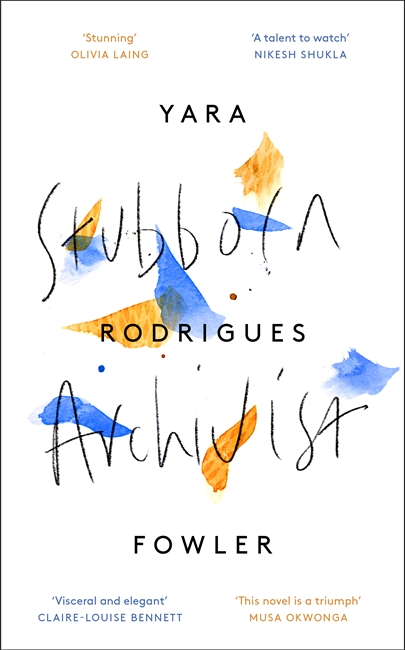You have no items in your cart. Want to get some nice things?
Go shoppingYara Rodrigues Fowler’s debut novel is a visceral experiment in form and language. A stylistically complex novel, Stubborn Archivist blends prose poetry and disjointed narratives, the result of which is a novel with a sense of urgency. The fractured writing style – sometimes one unpunctuated line to a page – mirrors the unnamed protagonist: a traumatized woman flailing in layers of hybridity. Stubborn Archivist manipulates language and highlights disquieting interactions veiled in normality (“Yeah, I’d heard of you, half Brazilian. I used to have a thing for Brazilian girls. Used to love Brazilian porn”). In an essay for Vogue Rodrigues Fowler writes,
“[Stubborn Archivist] in an enduring fit of self-love that came from so much anger and so much having been quiet and having been told from the moment I hit puberty that I should be just exotic enough and just not-foreign enough and attracted to men, of course. I loved this protagonist so much. I wanted to shower her in love and golden honey. She was born out of a love for my identity, my body, in all its violence and depression and silence.”
A novel that fuses who one is with “what” one is, Stubborn Archivist is as vulnerable as it is infuriating (“So, you’re half and half?”). It is a novel overflowing with violence and depression and silence, but there is love, too, and skin sticky with golden honey.
Spanning three generations, Stubborn Archivist fluctuates between Latin America and England, between grandmother, aunt, mother, and daughter. As the novel progresses, each woman necessarily modifies their understanding of belonging – sometimes finding it through language and food, sometimes through education and financial stability. But it is the novel’s blue-eyed protagonist, the reader’s stubborn archivist, who “mix[es] up the words in both languages to make sure [she is] always understood”. She is a woman of duality, with an English father and a Brazilian mother, aware of the “double lives” of various fruits, and the inhabitant of two vastly differing climates. She is a woman regularly exoticized by strangers, a woman traumatized and caged in a “broken up body”. And it is the sharp, short lines, and the subsequently empty spaces between them, that create an uneasy atmosphere; the stubborn archivist is hiding something.
Stubborn Archivist studies the intricacy of spatial belonging – belonging to a place (“You don’t look like you’re from here”), belonging to a community (“I don’t feel foreign / But you are foreign”), belonging to one’s own body (“And she would lean back and nod and raise a hand but they would hug her anyway”). It is the detachment from her body, in particular, that the protagonist addresses in a tense and revealing interaction with a former partner. Seated together in a bar, they observe each other between small talk – a cordial if somewhat awkward exchange between people who were once romantically and otherwise deeply involved. Amid his body language (“He leans incrementally infinitesimally forward”) and hers (“She looks away”), there is a profound and discomforting revelation. It is an admission of wrongness, a punctuated sentence, carefully wedged between the memories of the women who raised her. It is a sobering moment that brings the reader back to the early pages of the novel where Rodrigues Fowler writes the inner-dialogue of the protagonist,
“But there were good times / There were good times. Come on. Be honest with yourself. / Yeah the sex had been good sometimes. / You called it great / I know. / You called it— / Sometimes it was ugly. / But still / And she had loved him. / Yes. / And he had said – If you love me don’t you leave me / (if you love me) / And there were other things. But she’s a stubborn archivist.”
Yara Rodrigues Fowler’s novel is an eloquent work of messiness, of ugliness. The characters in Stubborn Archivist seek steady ground, finding their footing in a shared history. Does the reader ache for the protagonist; ache to know her name? Yes, the reader aches to know her. And yet, her namelessness is intrinsic to her identity. It, like much of what comprises her identity, was given to her without her permission. Perhaps the protagonist seeks a reprieve. And, oh, what a relief it must be: no one sounding it out or asking for the precise spelling or speculating about what it means. What a relief it must be, maybe just this once, to have something all to herself.
Stubborn Archivist is out now from Little, Brown.

About Cindy Withjack
Cindy Withjack holds a Master of Arts in Creative Writing from the University of Birmingham and is a PhD candidate at Lancaster University, where she is writing a novel. Her work has been published in theBurg, From the Fallout Shelter, The Huffington Post, The Journal, Slice Magazine, Litro Magazine, Women are Boring, and Banshee.





